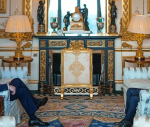You are here
Aleppo and the Turkish-Russian rapprochement
Aug 14,2016 - Last updated at Aug 14,2016
Many analysts believe that the battle under way in Aleppo could help the end of the Syrian crisis. However, it would be a mistake to think that this battle will come to a conclusion easily.
From the very start of the Syrian crisis, Aleppo has represented the weakest point for the Syrian regime.
It is not near the traditional strongholds of the Syrian government and holds a strategic position on the Turkish-Syrian border, which is a major entry point for weapons and fighters into Syria.
The battle could lead to a political solution in Syria, which so far has been stalled.
The Syrian army and its allies are pushing hard to capture the city in order to secure a key strategic foothold on the border, so it is likely that there will be a concerted effort in what could be a bloody, drawn-out battle.
Many of the groups that are fighting will fall if the regime can capture the city; in fact, some are even calling it the “promised battle”.
Some reports indicate that opposition groups received new supplies of US-made anti-tank missiles in order to hold Aleppo.
Meanwhile, the Russians appear to have little involvement at this stage. Moscow appears to be focused on influencing Turkish politics in order to achieve its ends in Syria.
The recent summit in St Petersburg between Russian President Vladimir Putin and Turkish President Recep Tayyip Erdogan was an important step for both the latter, who is seeking his way out of an internal crisis and the former, who is using recent events in Turkey as leverage to put an end to the Syrian crisis.
While Turkey’s role remains ambiguous, regional powers are clearly facilitating and supporting fighters in Syria and the border areas.
Politically, there is pressure on Erdogan to fall in line.
Recent events witnessed renewed calls for a Kurdish state, which could align Turkey with Syria and Iran, who are also rejecting such idea.
The prospect of economic cooperation with Russia, including various strategic projects, could lead Erdogan to rethinking his political positions and the way in which they aggravated the situation in Syria.
Erdogan’s desire to free himself from Western powers’ demands might also push him to reach a compromise with Russia, at least in Syria.
The battle for Aleppo is the last tactical confrontation with a clear path for a political solution to follow. While it may not end the Syrian crisis altogether, it could very well mark the beginning of a political process that brings an eventual end to the conflict in Syria.
It is, in fact, likely to lead to a battle in Daraa, in the southern part of Syria.
Over the coming days, we will see if Erdogan is really willing to cooperate with Putin on Syria. If not, Moscow may find itself obliged to step in to Aleppo and restart the frozen political process in Geneva.













